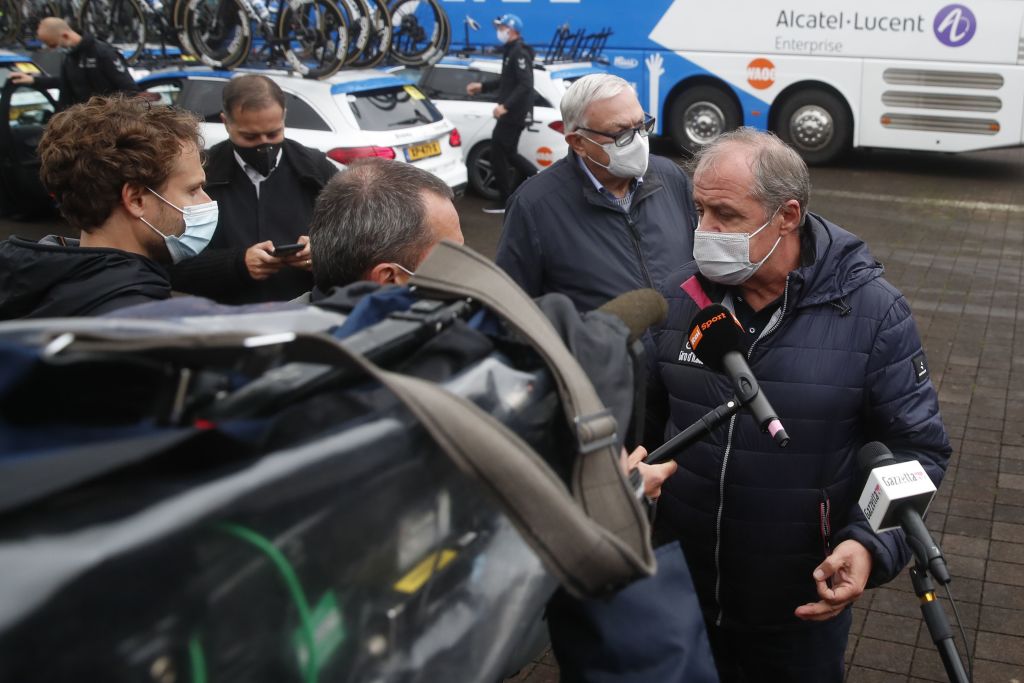Vegni: 'Somebody will pay' for protest that shortened stage 19 of Giro d'Italia
Race director insists he did not receive request until immediately before planned start

Giro d’Italia director Mauro Vegni has responded angrily to the rider protest that saw the distance of stage 19 reduced by 134km, describing the decision as “unacceptable” and insisting that he did not receive a request for the stage to be shortened until immediately before the start in Morbegno on Friday morning.
The stage was due to be some 258km in length, but shortly ahead of the start, a delegation of riders informed Vegni that they wanted the distance to be reduced, arguing that racing for six hours under constant rain was a health risk at this late point in the Giro.
After a compromise was struck, the 134 riders left in the Giro soft-pedalled the opening 8km of Friday’s route, then climbed aboard their team buses and drove ahead to Abbiategrasso near Milan, where a revised stage of 124km got underway shortly after 2:30pm local time.
“It’s an unacceptable decision, one that we’ve had to endure,” Vegni told RAI after the stage got underway in Abbiategrasso. “Right now, we’re thinking about getting to Milan but then somebody will pay for this.
“There’s regret for the bad impression we’ve made today as a sport, and I can tell you that today’s poor figure overshadows all of the good work we’ve done up to now to bring the Giro to an end in Milan.”
In a statement on social media, the riders’ association the CPA argued that reducing the length of stage 19 would “allow the immune defenses of the riders not to be put at greater risk.”
Adam Hansen (Lotto Soudal) wrote that the request to shorten the stage had been made on Thursday evening, a point refuted by Vegni. It later emerged that team representatives had voted 16-2 via a CPA Telegram chat to demand the stage be reduced.
Get The Leadout Newsletter
The latest race content, interviews, features, reviews and expert buying guides, direct to your inbox!
“I didn’t receive any request from any rider or any association, either yesterday or this morning,” said Vegni, a point he repeated more forcefully in an interview with La Gazzetta dello Sport: “Those who wrote that a proposal was made before this morning need to prove it, otherwise they’ll receive a letter from our lawyers.”
Vegni also noted that the weather conditions on the road to Asti were not sufficient to trigger the UCI Extreme Weather Protocol, which allows for races to be reduced in length in response to freezing rain, snow accumulation on the road, strong winds, extreme temperatures, poor visibility or air pollution.
“They knew the distance and they knew the Giro was taking place in October. In a Giro in October, you could get a wet day, but it was 13 degrees at the start,” Vegni said. “It didn’t seem like a dramatic weather situation to me, so there are no excuses.”
Concerns over rider welfare have been raised earlier on this Giro, including on stage 4, when a low-flying television helicopter blew barriers into the road and caused the crash that forced Luca Wackermann (Vini Zabù-Brado-KTM) out of the race.
Mitchelton-Scott and Jumbo-Visma left the Giro ahead of stage 10 due to confirmed coronavirus cases on their teams, while EF Pro Cycling called for the race to be ended after two weeks, citing concerns about the event’s coronavirus ‘bubble.’ The EF request was rejected by the UCI.
CPA president Gianni Bugno is on the Giro as a co-commentator for host broadcaster RAI and during coverage of Friday’s stage, he acknowledged that the weather conditions did not suffice to trigger the UCI protocol, but he argued that protecting the health of the peloton was paramount.
“The conditions clearly didn’t fall under the Extreme Weather Protocol. The weather was bad, and they’d faced testing conditions for the last two days. It was a transfer stage of 250km. Some riders perhaps started talking last night and when our representative Cristian Salvato found out, he went to the chief commissaire and the race organiser to ask to reduce the stage,” Bugno said.
“Afterwards, the protest started and that caused problems. I apologise to the Giro d’Italia organiser, to the viewers at home and the fans along the road, but the important thing was to protect the health of the riders, who have been giving everything.”

Barry Ryan was Head of Features at Cyclingnews. He has covered professional cycling since 2010, reporting from the Tour de France, Giro d’Italia and events from Argentina to Japan. His writing has appeared in The Independent, Procycling and Cycling Plus. He is the author of The Ascent: Sean Kelly, Stephen Roche and the Rise of Irish Cycling’s Golden Generation, published by Gill Books.